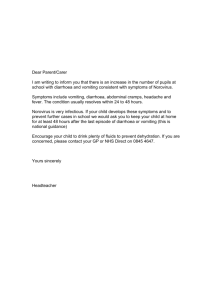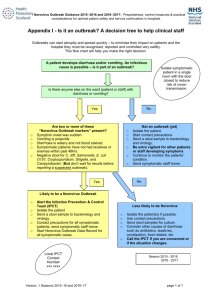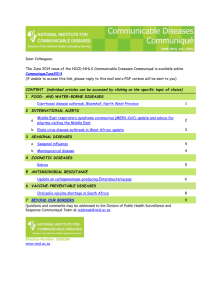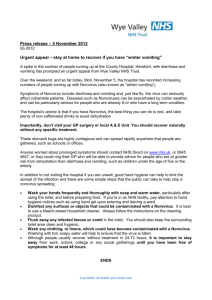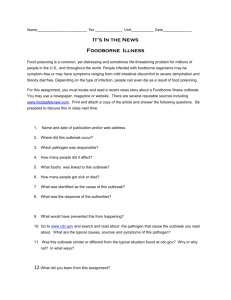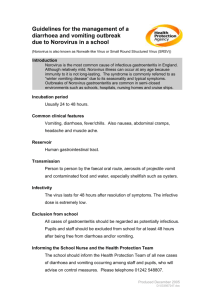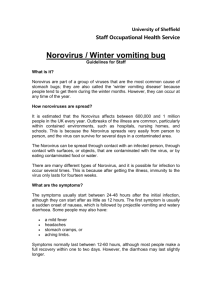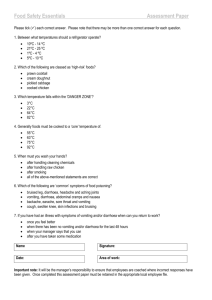Members of the Outbreak Control Team
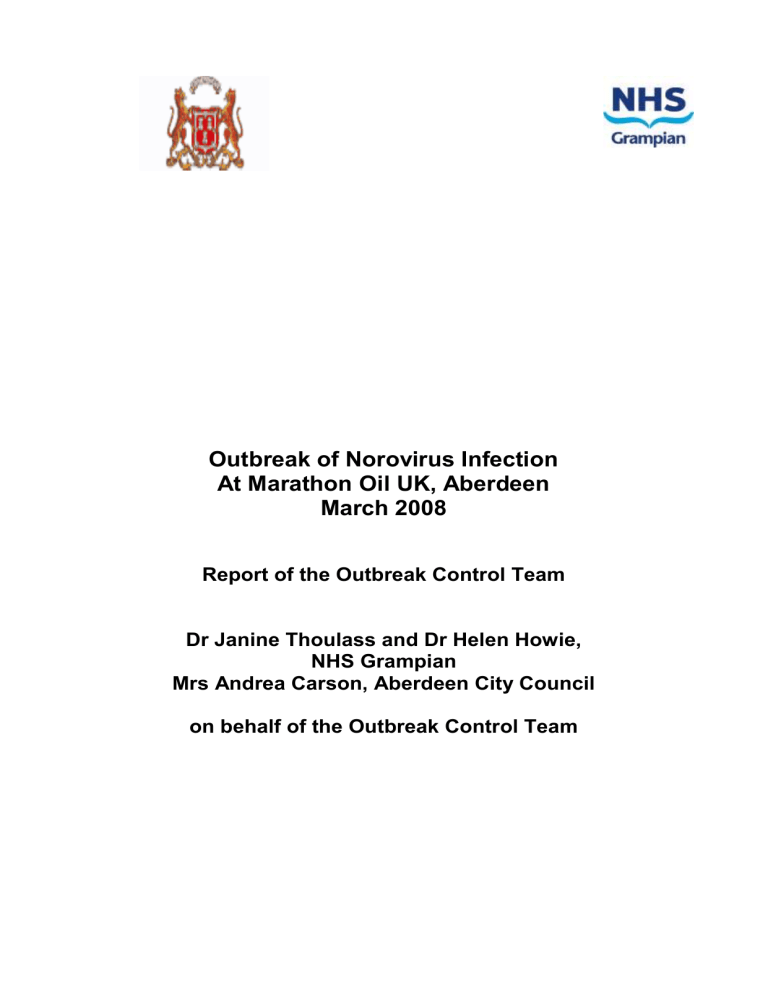
Outbreak of Norovirus Infection
At Marathon Oil UK, Aberdeen
March 2008
Report of the Outbreak Control Team
Dr Janine Thoulass and Dr Helen Howie,
NHS Grampian
Mrs Andrea Carson, Aberdeen City Council on behalf of the Outbreak Control Team
Acknowledgement
Dr Howie, Chairman of the Outbreak Control Team would like to express her thanks to the following for all the help and assistance received during the management of the outbreak and compiling the final report
All members of the Outbreak Control Team
Health Protection Team, NHS Grampian
Environmental Health Staff, Aberdeen City Council
Simon Haddaway, Health Protection Team, NHS Grampian
I would also like to thank Marathon Oil for their co-operation and the proactive approach they took during the outbreak.
Members of the Outbreak Control Team
NHS Grampian
Dr Corri Black
Fiona Browning
Dr Helen Howie
Dr Susan MacPhee
Consultant in Public Health Medicine
Health Protection Nurse Specialist
Consultant in Public Health Medicine (Chair)
Consultant in Public Health Medicine
Dr Ian Gould
George Mclean
Dr Janine Thoulass
Aberdeen City Council
Andrea Carson
Consultant Medical Microbiologist
Service Manager, GMED
Speciality Registrar in Public Health
Senior Environmental Health Officer
Capita
Dr Mark Cheeseman Occupational Health Physician
Health Protection Scotland
Dr John Cowden Consultant epidemiologist
Alison Smith-Palmer Epidemiologist
In attendance
Sharon Duncan
Stella Evans
Simon Haddaway
Corporate Communications, NHS G
Press Officer, Aberdeen City Council
Secretarial support, NHS G
Observer
Dr Vhairi Bateman Speciality Registrar in Medical Microbiology
1. Introduction
On Wednesday 19 March 2008, Environmental Health at Aberdeen City
Council was contacted by the Medical Advisor to Marathon Oil UK to report that more than 20 staff had “phoned in sick” with a history of diarrhoea and vomiting. The Medical Advisor was advised to contact the NHS Grampian’s
Health Protection Team. An investigation was initiated and Environmental
Health were asked to visit the premises
Four hundred members of staff work in the Marathon Oil office in Aberdeen.
All those affected worked in the same building and had potentially eaten in the staff restaurant on site which provides a wide selection of hot and cold foods free of charge. Most days about 360 lunches are served and about 30 breakfasts. Early reports suggested some catering staff were affected.
By early afternoon on 19 March, 67 staff had reported similar symptoms. An outbreak was declared and the first OCT was convened in the late afternoon of the same day (19 March) and a second OCT meeting was held on 20
March.
2. Background
Norovirus, previously called Norwalk-like virus or Small Round Structured
Virus, ca uses what is often called ‘Winter Vomiting Disease’ although it can occur at any time of year.
Norovirus is highly infectious and has an incubation period between 15 and 50 hours (range 4 -77 hours). Infectivity is thought to last for up to 48 -72 hours after resolution of symptoms. However, virus may continue to be shed in the stools after this but it is not known if this could still cause infections.
Transmission is usually from person to person by the faecal-oral route, although it may also occur from aerosols or environmental contamination, especially following faecal accidents or projectile vomiting. Some foods, especially bivalve molluscs, and water may be contaminated before entering the kitchen.
Food handled by an infected food handler but not subsequently subject to reheating is particularly vulnerable to contamination. The low infective dose of norovirus allows for extensive transmission via contaminated food and subsequent person-to-person spread. It is well documented that norovirus outbreaks are frequently associated with salads and sandwiches.
The most prominent symptom is vomiting, often projectile. Other symptoms can include nausea, diarrhoea, headache, fever and muscle aches. The illness is generally mild and short-lived (12-72 hours) though people with preexisting chronic medical conditions may develop more serious symptoms.
Individuals who have been infected may have some limited protection against re-infection but only for a short period and only against a similar virus type.
Reports of outbreaks of norovirus infection have increased substantially in recent years and most occur in closed or semi-closed communities, especially hospitals, care homes and leisure industry settings such as hotels, holiday and caravan camps, cruise ships and coaches.
3. Descriptive Epidemiological Investigation and Results
On the morning of 19 March there was only limited available information and a comprehensive list detailing all those who had phoned in sick was requested from Marathon. The company was also asked to provide copies of the recent menus. The standard enteric investigation form was adapted to facilitate data collection. Employees identified as ill with possible gastrointestinal symptoms were contacted by phone and interviewed. A previously symptomatic member of catering staff was interviewed in person by Environmental Health. Other key catering and cleaning staff also underwent detailed interviews with
Environmental Health staff.
The Health Protection Team conducted 49 detailed phone interviews over the course of the afternoon of 19 March and the morning of 20 March. A food history was included but this focused on foods eaten at lunchtime on the 17 and 18 March as it was not known initially that a small number of staff could also have had breakfast at work.
By the morning of the 20 March numbers of affected individuals had risen to over 100 and with the information gathered it was possible to identify key features in the history of those who were unwell. No further phone interviews were conducted but an abbreviated questionnaire was designed and distributed via email to all Marathon employees with the request that anyone who was symptomatic over the relevant time period should complete it. An additional 76 people returned the questionnaire. Information was collected on a total 125 cases of the 153 affected (81%). The total number affected was based on the information supplied by Marathon of the number of employees who had reported gastrointestinal illness.
3.1 Case definitions
Possible outbreak cases
An individual who worked or visited the Marathon office in Aberdeen and became unwell with diarrhoea and/or vomiting before midnight on 17 March
2008.
Probable primary outbreak case
An individual who worked or visited the Marathon office in Aberdeen between
Monday 17 and Thursday 20 March 2008 and became unwell with diarrhoea and/or vomiting after midnight on 17 March and before 4pm on Friday 21
March 2008.
Probable secondary outbreak case
An individual who worked or visited the Marathon office in Aberdeen between
Monday 17 and Thursday 20 March 2008 or contacts of these individuals and
who became unwell with diarrhoea and/or vomiting after 4pm on Friday 21
March 2008.
Detailed interviews and questionnaires were only sent to employees of
Marathon however other contacts outside the workplace such as family members could also be a secondary outbreak case but few of these would have been captured in our data collection.
3.2 Results
From the 125 detailed interviews and questionnaires conducted with staff affected, it was established that:
44 cases (35%) were women and 81 cases (65%) were men
Age range was 21 to 61 years
Earliest reported symptoms thought to be related to the outbreak occurred at approximately 8 am on 17 March when a member of the catering staff became unwell at work and vomited in the staff toilets. He immediately went home but was allowed to return to work the next day.
2 other catering staff were possibly exposed to aerosols from vomit and both subsequently became unwell.
At least 1 other member of staff vomited on the premises
In the 49 detailed interviews 7 cases reported gastrointestinal illness in family household members in the preceding 3 weeks.
Symptoms
80 cases (64%) reported diarrhoea and vomiting
12 cases (10%) reported vomiting only
33 cases (26%) reported diarrhoea only
50 cases (40%) reported fever
89 cases (71%) reported abdominal pain
Three cases reported symptoms with time of onset in the 20 hours prior to the midday meal on the 17 March. Two of these cases have been categorised as
“not outbreak”
One case with onset on 16 March was found to have campylobacter and therefore was not part of the outbreak
One case with onset between 0000 - 0400 on 17 March was interviewed but the information on the form was inconsistent with other records and with a subsequent later absence from work and was not considered part of the outbreak.
One case has been categorised as a “possible outbreak” and complained of nausea at 12 midday on the 17 March but vomiting and diarrhoea did not develop till over 24 hours later
Food specific attack rates were not calculated as information was only available from those who were ill.
Figure 1 shows the epidemic curve. Each day is split into six periods of four hours. Please note some cases were excluded from this analysis as only a date, rather than a time of onset was provided. Seven further cases were
reported beyond the time period depicted in the graph between the 22 and 25
March and these are likely to represent secondary person to person spread.
Figure 1 Epidemic Curve
25
20
Probable outbreak
Possible outbreak
Not Outbreak
Index
15
10
5
0
Sun 16th Mon 17th Tues 18th Wed 19th Thu 20th Fri 21st
Date and time
4. Environmental Health Investigation and Results
Environmental Health staff visited Marathon Oil on 19 March and 20 March to inspect the premises, interview catering staff and to take environmental swabs and food samples.
4.1 Food service
Catering at Marathon Oil is provided by Universal Sodexo.
Hot breakfast consisting of sausage, bacon and eggs is provided for about 30 staff. Teas, coffees, fruit and plated biscuits are provided to conference rooms
Fresh fruit is available to staff throughout the building.
Lunch is provided every day for about 360 staff. A range of hot food is provided every day plus preordered ‘picnic lunches’, and salads. Sandwiches are also made to order. Pre ordered ‘picnic lunches’ consist of sandwiches, fruit, soft drink, dessert (trifle, fresh fruit salad, cheesecake or yoghurt) and chocolate bar or biscuit. On the 17 and 18 March the following dishes were available:
Monday 17 March (St Patricks Day) Tuesday 18 March
Potato and leek soup
Mince pie and beans (fast option)
Killarney Vegetable tartlet
Dublin Lamb casserole
Galway Seafood Pie
Selection of vegetables
Salad
Sandwiches
Apple surprise
Fruit salad and cream
Selection of fruit cold sweets
Carrot and coriander soup
Fruit juice
Stovies and oatcakes (fast option)
Chilli Beef
Spring vegetables and crusty cheese
Scampi
Selection of vegetables
Baked potatoes with fillings
Salad
Sandwiches
Peach crumble and custard
Fruit salad and cream
Selection of fruit cold sweets
Water dispensers and hot drinks machines are located throughout the building at various locations and appear to be fed from a mains water supply.
4.2 Kitchen inspection
The kitchen inspection was generally satisfactory with good separation of raw and cooked foods. Bactericidal detergent was being used on food contact surface and hand contact surfaces. However some food debris was observed behind and below equipment.
Marathon had been advised on 19 March to deep clean the kitchen with hypochlorite solution prior to use on 20 March and a specialist company had been contracted to undertake the cleaning. However, on inspection on 20
March it was apparent that this cleaning had been insufficient and hypochlorite had not been used. Environmental Health staff instructed
Marathon that the deep clean was to be repeated using the appropriate chemicals as had been previously advised.
4.3 Catering staff
The Environmental Health staff interviewed the member of the catering staff who reported symptoms on the 17 March. He had started work on Monday 17
March at 7:30am preparing breakfast items, desserts and bagging up preprepared bakery items. At 8.20am he felt sick and at 8:30am vomited in the male food handler staff toilet and was sent home immediately. He visited his
GP that afternoon who is alleged to have told him he could return to work. He returned to work on Tuesday 18 March at 7.30am and took up his normal food handling duties which included preparing breakfasts, chocolate truffles, desserts and sandwich fillings. He also worked a full day on Wednesday with similar duties unaware that he should not have returned to work. In addition,
he delivered food and drinks to the conference rooms, prepared salad items and made up some sandwiches to order at lunchtime.
Senior catering staff on site seemed unclear about the Universal Sodexo policy with regard to return to work after gastrointestinal illness and whether clearance samples were required.
4.4 Cleaning
The toilets in the kitchen area are cleaned once a day at 2.30pm and there was no additional cleaning undertaken following the caterer’s vomiting episode at 8.30am. All other toilets in the building (approx 14 rooms) are also cleaned by day cleaners at 7.30am and 2.30pm with a deep clean by the night cleaners. The methods reported to clean the toilets were satisfactory. At the time of the visit, the cleaners were deep cleaning all hand contact surfaces throughout the site with hypochlorite.
5. Microbiological investigation and results
Stool samples were requested from affected individuals who were interviewed. The faecal samples were analysed using a commercial ELISA
(enzyme linked immunosorbent assay) which detects norovirus antigen.
Norovirus was identified in 10 stool samples. Campylobacter was isolated from one faecal sample but this was unrelated to the outbreak. No other bacterial pathogens were isolated.
Food and water samples and environmental swabs taken from the kitchens, wash hand basins and water dispensers were submitted to the Aberdeen
Royal Infirmary Public Health Laboratory on Thursday 20 March. No bacterial pathogens were isolated.
6. Control Measures
All affected individuals were advised to
Increase hand hygiene
Increase environmental hygiene at home
Not to return to work until 48 hours after their symptoms had settled
On 19 March Marathon was asked to
Deep clean the kitchen with hypochlorite
Discard all fresh and unwrapped foods
Ask staff to remain away from work until 48 hours symptom free
Increase environmental cleaning in building, especially toilets and hand touch points
Remove communal fruit bowls
Stop self service and ensure all food served by catering staff
Marathon closed the staff restaurant from midday on 19 March and as an additional measure as it was the Easter weekend they closed the company premises on 20 March to facilitate the deep clean and minimise mixing
amongst staff. Staff from the affected building were not allowed to go offshore to minimise risk of introducing the infection to the offshore community.
7. Communications - with public, press and professionals
Staff at Marathon Oil were advised of the outbreak and then updated on a regular basis by management via e-mail. These emails contained practical information with infection control advice and reiterated the importance of staying off work for 48 hours after the cessation of symptoms and were issued after discussion with the Health Protection Team.
All General practitioners, NHS 24, G-MED, Accident and Emergency at
Aberdeen Royal Infirmary, the on-call Public Health Staff and Scottish
Government were alerted to the outbreak on 19 March and the Community
Health Partnerships were informed on 20 March. A press statement was issued on 19 March.
8. Discussion
Guidance published by SCIEH ‘The Identification and Management of
Outbreaks of Norovirus Infection in Tourists and Leisure Industry Settings’ describe criteria for norovirus infection and advise that if four out of the six criteria below are met that outbreaks should be assumed to be caused by norovirus and managed accordingly.
Vomiting (often projectile) in >25% and up to 50% of cases
Duration of illness (12-72 hours)
Incubation Period (12 – 48 hours)
Guests and staff affected
Negative bacteriology
Positive norovirus PCR or other diagnostic test e.g. norovirus ELISA positive
Early in the investigation it became apparent that the first four of these criteria had been met and the outbreak was managed as a suspected outbreak of norovirus infection.
The epidemic curve shows an initial rapid increase in the number of cases with a peak 36 hours after lunch on the 17 March. This pattern would be consistent with a point source such as an infected food handler. The subsequent regular peaks at the 20:00-24:00 time period each day is consistent with two possible mechanisms of spread.
an intermittent point source due to continued viral shedding from an infected food-handler with exposure at lunchtime 36 hours previously
and/or secondary person to person spread with peak exposure during toilet or lunch breaks when staff were most likely to mingle.
If norovirus was circulating in the community it could have been introduced into the building by any of the staff but this was not supported by interviews.
However, not all staff were interviewed there may be a reporting bias as staff may have been reluctant report a prior family illness.
Whilst writing this report it was noted that the Health Protection Agency in
England in their Norovirus Information leaflet for Health and Social care staff now advise that ‘Symptomatic people should not prepare or handle food for others until they have been completely free of symptoms for 3 days (including nausea)”. It is unclear if this advice is extended to food handlers in other settings e.g. restaurants.
9. Conclusion
The descriptive epidemiology was consistent with an outbreak caused by norovirus and this was subsequently confirmed by laboratory testing. The findings suggest that the infection was introduced into the workplace by the infected food handler and exacerbated by his early return to work when still likely to be shedding virus. However, norovirus was not isolated from the affected foodhandler.
Spread of gastro-intestinal infection, whether person to person or via a common source (such as contaminated food) can be minimised by excluding affected individuals from work or other institutions. All individuals who report diarrhoea and/or vomiting are advised not return to school or work until 48 hours after resolution of symptoms. The lack of awareness of company guidelines by senior catering staff was likely to have increased the number of staff exposed.
10. Recommendations
10.1
Re-iterate the importance of people with vomiting and diarrhoea staying away from work and school, and other public places for 48 hours after their symptoms have settled to avoid spreading the illness. Action
Health Protection Team and Environmental Health Staff
10.2
Re-iterate the importance of environmental cleaning of areas where diarrhoea or vomiting could have caused contamination.
Action Health
Protection Team and Environmental Health Staff
10.3
Ensure that food-handlers are aware of safe working practices, how to access guidance and that they adhere to them. Action
Environmental Health Staff
10.4
The Group revising the Investigation and Control of Foodborne disease in Scotland should be asked to consider whether the Health Protection
Agency advice that symptomatic individuals should not prepare food for others for three days after gastrointestinal symptoms have settled should be adopted in Scotland and, if so, in which settings. Action
Health Protection Scotland.
Appendix 1
Action Plan
Health Protection Team will
Revise NHS Grampian Exclusion policy and reiterate the importance of 48 hours symptom free after gastrointestinal infections.
Continue to provide 48 hour symptom free advice to all individual with gastrointestinal infections and include in patient information leaflets.
Continue to include this advice in all letters to GPs during gastrointestinal outbreaks and in all press releases about gastrointestinal infection.
Continue to include this advice in teaching delivered to Healthcare professionals and students where appropriate.
Continue to provide advice on environmental hygiene to cases, schools, care homes and other settings as appropriate
Dr Howie will ask Dr Cowden to raise HPA advice with the working group revising FSA/SGHD guidance on foodborne infections
Place copy of Outbreak Report on NHS Grampian Website and ensure
Aberdeenshire and the Moray council EHOs receive a copy
Environmental Health
A letter was issued on 24 April 2008 to all catering establishments in the
Aberdeen City area regarding gastro-intestinal illness and the 48 hours exclusion of affected staff.
A seminar is planned for Autumn 2008 about gastro-intestinal illness exclusion and prevention of spread in catering establishments.
Health Protection Scotland
Dr Cowden has requested that working group revising FSA/SGHD guidance on foodborne infections considers the HPA advice
